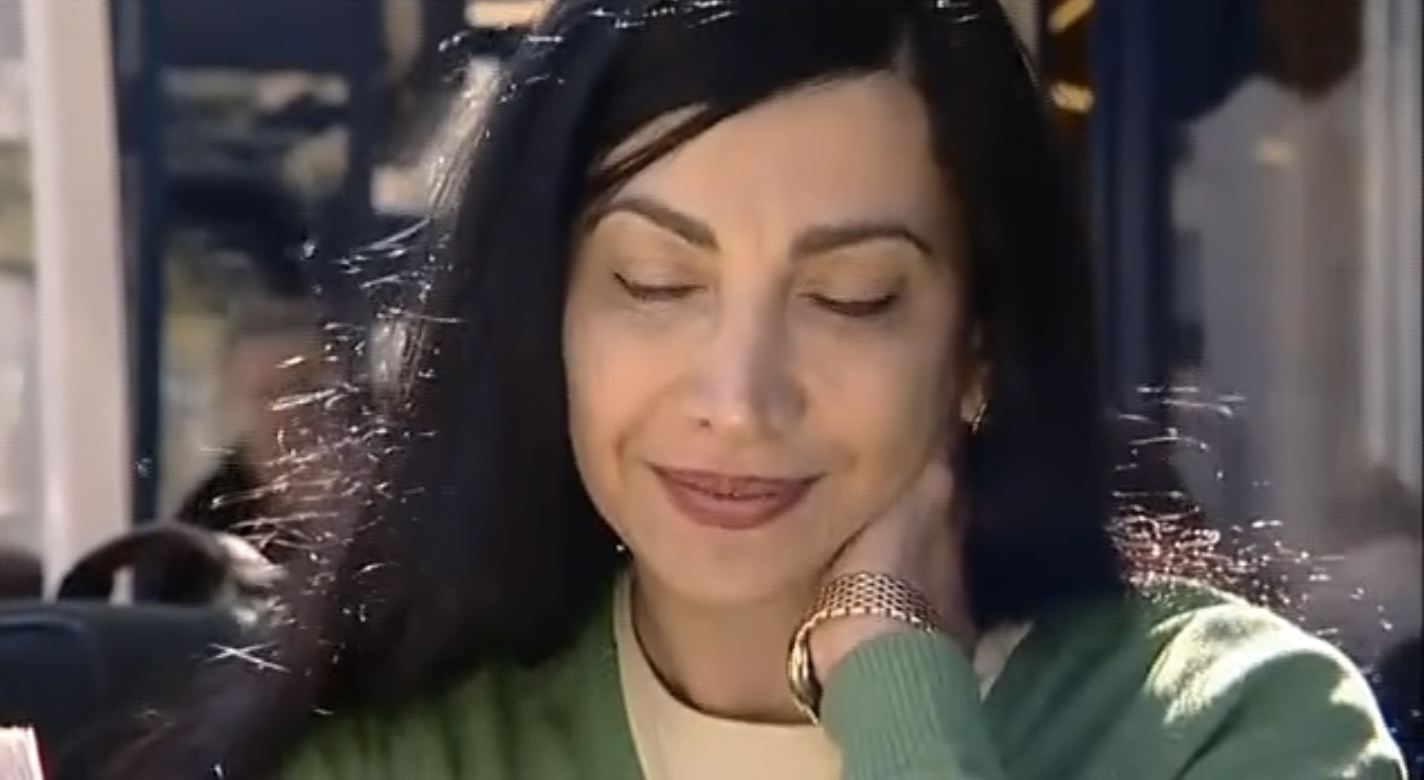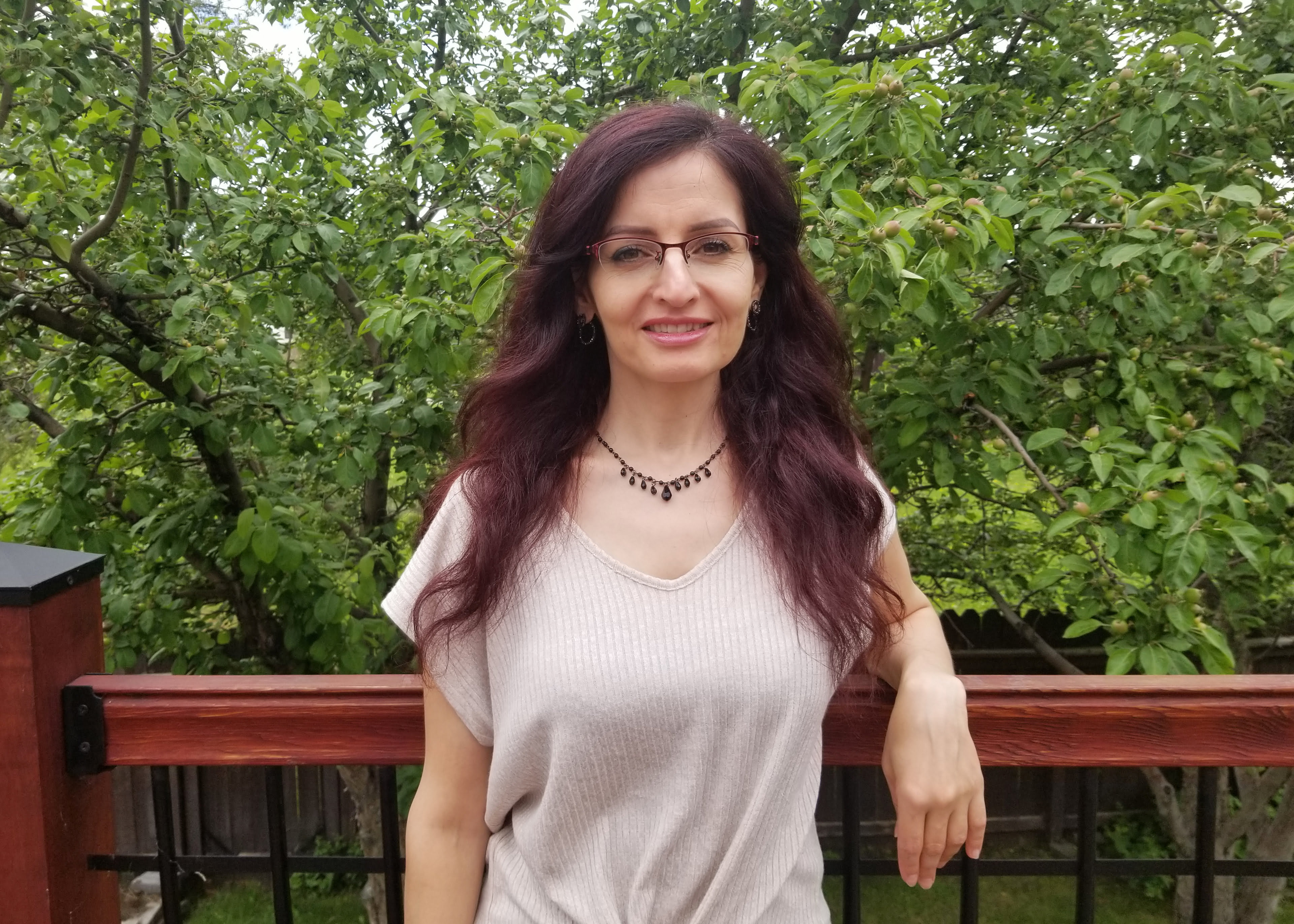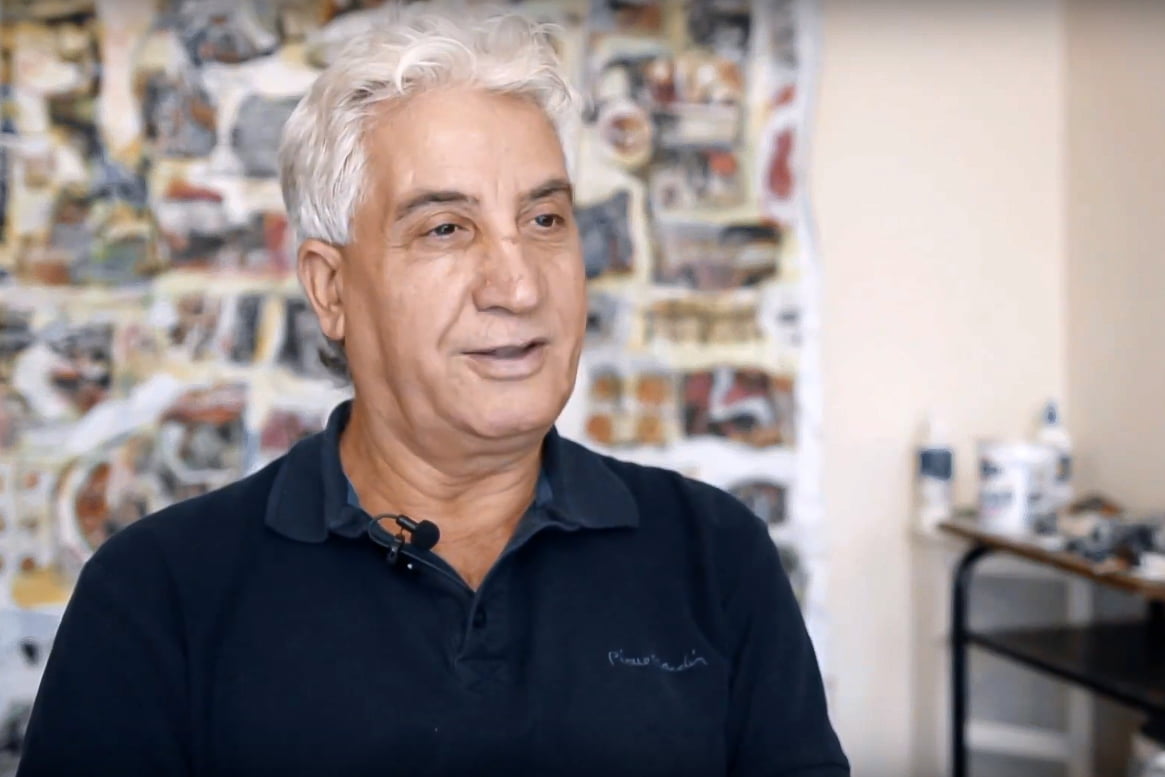Pain of a woman in search of love
Maram Al Masri, the award-winning Syrian poet who has lived much of her life in Paris, met our colleague Samar Shahdad, an Iranian poet, who is based in Bradford. The two women are seeking their identity not in the geography of their birth country but also in poetry. A destination, which Maram believes can only be reached once one starts the journey from within.
Samar: I love your poetry, Maram! …and I love you and I have always said you are very inspiring.
Maram: How should I answer this after such nice words? You know, I thank you. I love to hear from the people that I love, that love my poetry. Thank you so much for inviting me to be here with you now.
Samar: Wonderful!
Maram: …although we are far away, but I still feel you are so near. Thanks internet to be in such a relationship.
Samar: When I hear Maram Al-Masri, in my mind, I’m thinking that you are an exiled female poet, and I am going to start with the fact that you are a woman. And you have brought that into your poetry. And you are a woman who claims and reclaims her body. You are a woman who has not only awareness of her body but also doesn’t feel shy about talking about her desires and physical passions. You bring your body forth, and we both come from countries where women, their bodies, are seen as devious objects.
Maram: Yeah. That’s true. I think to be female and then to be a poet is a great challenge in the 21st century. Even I think it is difficult to claim that we are women. I think writing gives me the chance, and the poetry gives me the chance to claim what we are, what I am, what our rights are in this life. So, I think it is not easy to be a woman, it is not easy to be a poet.

Samar: I read you said in one of your interviews that “being a woman is a revolution”, which is true. One of my favorite intellectuals is Germaine Greer. She writes in her book, “The Female Eunuch”, that “freedom is fragile and must be protected. To sacrifice it, even as a temporary measure, is to betray it.” I think that you can not betray your gender, your body, and that’s quite revolutionary. Isn’t it?
Maram: It is. I think I am a revolutionary woman since I wrote my first poem. I think to claim that I exist is a kind of revolution. To be in love is a revolution. To divorce is a revolution. For me, all the acts that I have done are a revolution. So, I cannot betray myself, and I cannot betray the women who are like me. So, I am engaged in this kind of combat to raise the voice of women.
Samar: Yes, absolutely. What I like about you is that you remind me of the Iranian poet Forough Farrokhzad who paid a very big price for being a woman, speaking out and writing directly about her desire. Her poem,“Sin”, describes a time when society was much more closed. When I read your poems, I see a woman who is fully engaged in the art of loving and lovemaking. Your body is not excluded and I see a woman who dares to say I love, and I want to give, and I want to receive; I want to say yes, I want to say no, and I have total control over my body. Because it is a big part of my experience, my being.
Maram: Yeah. That’s true! You know for a long time women have been excluded from speaking even in the street, they are hidden. Women are all the time wrapped in a certain way. This is so, even with poets, there are not a lot of women poets. Now, however, there is much more because of the Internet. But to publish and to dare to publish takes a great courage. I know some of them, they don’t use their real names, they use fake names so as to not be blamed by their families. I think women are constantly subjected to the … I don’t know how to say it in English. But they are always hidden, they are treated like haram حرام like something عورة , you know I don’t know if there are more words in English. A woman who can write, who can speak, who can say I exist is a dangerous woman; so, we are dangerous. All the women who wrote about their liberty, the freedom of thinking, their body, their desire, they make men afraid. We are like good soldiers to make life better. We want to find a balance between the power of men and the power of women. We don’t want to make a war, we only ask to have a place in this nice world.

Samar: Yes absolutely, absolutely. You are a woman and you happen to write poetry. But for me, the first thing to note is you are a woman and now we are going to discuss you as a poet. You are a woman who writes poetry and, of course, being a woman has influenced your poetry. You are like me, living away from your place of birth. And for quite a long time, I mean, of course, every one of us is aware of the importance of language and the role it plays in our lives, to connect us, to make us able, to give us this ability to interact with other people, to tell them I love them, we love them, we are tired, we are sad, we are hungry. We are trying to express ourselves.
If you are a poet, you have a very intimate relationship with language, and words.
Maram: that’s true.
Samar: …and if you are away from the place of your birth, you become very conscious of what is happening to you and your language. I am not going to use “mother language.” Because what is mother language? my first language used to be Farsi. I don’t speak that very often now and I consider English as my first language. A language, I found home myself, you know, in it. I want to ask you, what is your language Maram? what language makes you feel home?
Maram: It is a very good question because I write in English and Arabic, and for thirteen years, I didn’t write poetry. I didn’t even write. I think it was a kind of decision not to use Arabic because I was angry against my culture, against my religion. I don’t know if you know because I had a small child who was eighteen months old, who was kidnapped . So for me, the way to show my anger was to be silent, to not write language that will make people think badly. Because my ex-husband is also Syrian, language was my way to affront the world. For fourteen years, I didn’t write poetry but rewrote poetry in Arabic because it is the only language that I know. Not because it is my mother language. Because, you know, Arabic is two languages: the dialect you speak when you are young, and then at 6 or 7, you start to read or to write Arabic, Classic Arabic. So, it is not our second language, it is the classic language that I write now. All these are ways of translating your emotions, your observations, your relationships with the world. I write in French because I live in France, and I wish the people around me would know the woman that I am. I also wish to know the person I am when I write in the language of other people.

It is not easy to distinguish all the languages that live in us and, most importantly, poetry can be the language that we write. I don’t know if I am clear because it is not easy to speak in English because I speak French daily. Now I speak English, and I have to find the words that fit with my thinking, it is not easy. But I hope that I am clear.
Samar: I have a friend who says “Samar! You no longer have a first language” and it is so true. I told a friend of mine a couple of days ago that I have a conflict with my relationship with language, which is a very basic thing for us as human beings. I mean, when I want to write and think of loss, the language is Farsi, when I want to talk about daily life and living, the language is English. When it comes to love, the language is Portuguese or Spanish. I am all over the place, you know, I am all over the place.
Maram: That’s true. I think where we have to try to have this bridge that links us with others. And what is the bridge? It is the language. If you are in Spain, you like to speak Spanish to be understood by the people who are around you. So, language is the way to give our heart to other people to hold.
Samar: I read in one of your interviews that you said, it was very interesting and I can resonate with, “my poems are not for the arabic public, my language does not resemble their language, nor do my ideas,” As a Syrian woman who writes as a Syrian woman and speaks as a Syrian woman and lived in France and being exposed to the wider literature, your language has concepts, ideas that may not be familiar with people who don’t experience, don’t read that language, don’t read that literature.
You said something that resonates with me: “my poems are not for the arabic public”
Maram: Yeah, that’s true.
Samar: You said, “my language does not resemble their language nor do my ideas resemble theirs.” I can resonate with that. Because I see myself as someone who was born in Iran, but doesn’t think anymore as an Iranian woman. I feel like the experience of living in the UK for over twelve years has exposed me to different ideas, philosophies, way of living, and different kinds of literature, broader literature. I write and I feel like an Iranian woman, but I think as someone who lived in the UK over a decade.
Maram: I think for me sometimes I am astonished: sometimes, I think like a Syrian woman, after forty years living in Paris. Sometimes, I feel my oriental or my Syrian origin has become stronger. The Maram who lives in France and Paris and who goes all the world, you know. Sometimes, I feel that there is something so strong that still lives in me, some fear, sometimes I am afraid, and I think when I am afraid I feel like an Arab woman. Sometimes I feel I am made of two women: at times the Arab woman takes the place of the French woman. So it is all the time I have this duality, between what I have been and what I am now. That’s why I wrote the book, “I look at you”, because it is the duality between me and me, to say that we are not only one, we are various, we are many. I am occidental as well as oriental, I am free as well being a prisoner. I experience duality, having two languages, being young and becoming old, being strong and at the same time being weak and only surviving, being healthy and being ill. I had cancer two years ago and I felt that I was going to die. A woman is constantly struggling, struggling to be at least a little bit happy.

Samar: I come from a country where we have traditional Persian literature, and we have a new wave of modern literature. I want to ask you, for you to be a female poet, the one you want to be, and write whatever you wish.
Maram: Certainly.
Samar: I come from a country where we have traditional Persian literature, and we have a new wave of modern literature. I want to ask you, for you to be a female poet, the one you want to be, and write whatever you wish, have you broken up with the traditional Arabic poetry?
Maram: When I start to write, I write something that doesn’t look like Arabic literature because I think I was nurtured by western writers and stranger and foreign writers. I did not feed myself with the Arabic poetry, the poetry of Mutanabbi, Adonis, my only source was Bob Dylan The Beatles and Andree Chedid They were foreign, so that’s why my language has been different from all the poems written. So they said, what is she? She is a revolutionary. Because she wrote something so short, without any extravagant vocabulary. It was so simple, it is strange. It is not like us. So I think my language has been purified from all the heaviness the Arab literature has. Even the Arab literature is beautiful, but I think my language has been affected by the foreign or an European writers, Russian writers, Indian writers, but never Arab writers. That’s why maybe I have written something unusual and challenging.
Samar: I think if you live in displacement, if you are a displaced poet, you invent your own language, you define your own identity, you have to because you have no other option
Maram: That’s true
Samar: …and I think you have invented your language and what matters is not what language you speak. It is not about speaking French, Spanish, Portuguese, it is what you are saying in that language that is important. I think the disconnection between you and some of the Arab audiences is what you are saying, that does not attract the audience to your poetry.
Maram: That’s true, that’s true, dear. I think I invented my language, I invented my language and even in France, sometimes, my editor says to me “we have to create a dictionary named ‘Maramism’ because you do with the language what you like.” Yes, because language for me is not sacred, not something to adore. Language for me is a lover and when you love, you make mistakes sometimes, but you have this power to be in contact in the subtlety of it , Because you have this talent to love it; to love the language and to use it with love. That’s why maybe my poetry is not for Arabic people. Because Arabic people love what is so strong, what is difficult, what is a musical. I am not attracted to poetry that comes with noise and music, I want few words and quietness…
Samar: I totally understand, it’s like Arabic literature has always wanted to bring something very epic, announcing “I am strong”. But you are talking about your break ups, you are talking about being broken, you are talking about being a lonely woman, you are talking about love affairs that did not end very well. So you are looking for a language, you invent a language. I used to tell my friend that I am a child who is teething but can not say” I am in pain”. I don’t know what language I need to use? What are the words I need to use? …and that’s why over time, I became more interested in language than in poetry. And I do believe what you are saying. Language for us is a living being, we leave people, places and families behind because to us language is a living being, a person. Language is a person. I know that it sounds mad, but it is a living person to me, which is why I sacrifice for it.
Maram: That’s true and I agree with you and I feel that we are poets, and this qualification gives us this right to use the language to show our inner feelings and express them to the world. I think all the arts are a way of making people recognise that they are the same and our pain is the same. But for a woman, when she speaks about her passion, it terrifies people, it shows her as she is, naked, and the nakedness makes people terrified. You can not look at the nakedness without feeling overwhelmed. It is much more dangerous to be naked in a poem than to be naked in reality. To take off your clothes, is it? But to reveal your body, to open it and to show what is there, well, some people cannot. So, beautiful or ugly, people can only blind themselves because they are afraid to know what you have inside you.
Samar: I have a poem titled “naked, I want you naked”. You have a book titled “liberty walks naked” and I am so in love with this simple sentence . You bring liberty and beauty together, you bring transparency and justice and merge them together . These are twin sisters, one can not live without the other. That’s why I say you are a revolutionary poet, Maram, who thinks about revolution through poetry. That’s wonderful.
Maram: thank you Samar !
Samar: You are a female poet who happened to be in exile. For years, you’ve been living in France. The German philosopher Adorno says “for a man who no longer has a homeland, writing becomes a place to live.”
Maram: Thats’ true!
Samar: You told me you want to be a woman, you want to write as a woman; you told me of your challenges with Arabic, your hope in other languages to express your ideas that are forbidden or not common to be used and expressed in Arabic. Tell me about your displacement, how much it has affected you as a female poet?
Maram: I think a lot. As they said to me , you know we don’t know when you write who will receive it, who will be affected by it and who will be touched by it? I think there are a lot of critics who wrote and they said Maram has affected a lot of poets and a lot of poets wrote as Maram wrote. I changed my place, my language. I am in a place, but I was born in another country and place and am now in a different place . Maybe this also is some kind of wealth, you are much bigger. You grow so much that you cannot be narrowed down and be contained in one place. Because your eyes are looking to other things and you inhale another atmosphere. I think we are the fruit of where we live, what we see and what we eat. Everything can touch our poetry and affect its meaning.
Samar: Yes. Absolutely . As a female poet who lives in exile, I believe that we need to have a strong imagination. We travel a lot back and forth using our imagination. We imagine a lot. And I can imagine you are missing Syria very much but at the same time, you don’t see any chance that you can live there as the person you are. You find it very difficult. How do you deal with this challenge? How do you cope with nostalgia and at the same time the disappointment?
Maram: I think, sometimes, I said as if I live in between two countries. I live in an aeroplane and the aeroplane is still hanging in the sky. It is difficult when I go there. I used to go so rarely to Syria and now I cannot anymore. That makes Syria so dear for me, but I don’t think that I can live in Syria anymore. But I wish to see Syria safe and the people in Syria live like other people in dignity and liberty. So, that’s why my nostalgia for Syria is my nostalgia for peace. I used to go to Syria, and when I was there, I felt like I was a stranger. In Paris, sometimes, I feel that I am a stranger. For us, I think we are strangers everywhere we go . Even when we are not actually but this feeling of being stranger is in our heart and we suffer sometimes because sometimes I say if I die where should I be? Where will it be? Where will my body go? Where is my burial place? In Syria? In France? I don’t know. It’s hard to feel that you are forbidden to go to your country. Even if you don’t want to go. But it is hard for me to feel that I am exiled, definitely from the people that I love, from the country that I love.
Samar: That’s so true. We need to make our identity, our language and also our homeland. The greatest Palestinian poet of all time, Mahmoud Darwish, writes “free of worshipping yesterday, free of my metonymy and my language, and only then will I testify that I’m alive and free when I’m forgotten!”

Maram: Yeah , yeah
Samar: Where is home Maram? Home is where you are happy , where you can speak what you want to say, you can write what you want to write, you can love whoever you want to love. Isn’t it?
Maram: That’s true. Because I want that, because I don’t want to surrender myself to the obscurity. Because I want people who love not to suffer for my suffering. So I try all the time, you know. For me, being a poet is a great responsibility. I feel that like a mother who gives food to her children, she has got the best food and I feel that a poet is similar. A poet has to ameliorate, has to improve themselves to be pure and good for the people who love them. It is some responsibility of being an activist to ameliorate the world. If I want to make the world better, I have to start with myself. So everyday, I try to improve myself and remove what makes people who love me suffer.
Samar: Wonderful! Maram Al-Masri

Interview by Sama Shahdad



